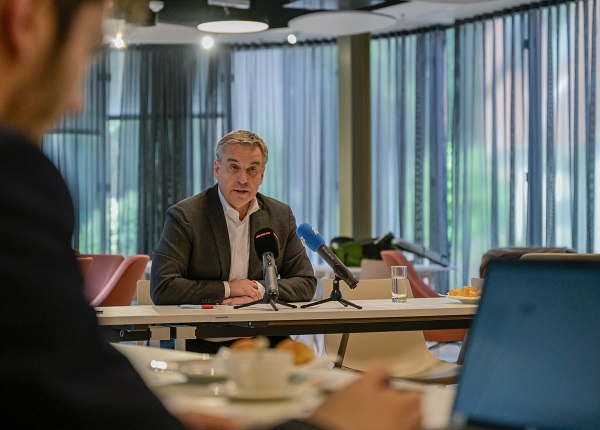 Claude Meisch, Luxembourg's Minister of Education, Children and Youth;
Credit: MENEJ
Claude Meisch, Luxembourg's Minister of Education, Children and Youth;
Credit: MENEJ
On Thursday 12 September 2024, Luxembourg's Ministry of Education, Children and Youth held a press conference ahead of the 2024/2025 school year.
Focusing on several aspects of the digital world, Luxembourg's Minister of Education, Children and Youth, Claude Meisch, stated: "The effects on our children of excessive use of smartphones and social media worry me. In addition, time spent looking at your smartphone is often wasted time. Time that is then lacking for other activities that are essential for the healthy development of children. What matters is the right balance between the digital world and real or analogue life. To achieve this balance, we need clear rules. At home. At school. In society."
The minister thus emphasised that "screen-life balance" (the balance between screens and real life) is a "top priority" for this school year. The ministry is therefore proposing new regulations for the 2024/2025 academic year concerning the use of smartphones in educational structures.
In all primary schools, smartphones will be completely banned from Easter 2025. In secondary schools, a physical distance must be guaranteed between the student and their smartphone during lessons.
Beyond this principle, secondary schools are free to introduce additional restrictions, within the framework of their pedagogical autonomy, to regulate the use of smartphones according to the age of the students, the time of day or different areas of the school building. These measures can go as far as a general ban on smartphones.
Secondary schools have until Pentecost to develop or adapt their own concept.
The measures taken in schools will be accompanied by awareness-raising actions among parents. On 30 September 2024, a campaign dedicated to screen-life balance will be launched, with concrete recommendations for the safe and responsible use of digital tools, according to children's age categories.
This campaign will be accompanied by a series of information sessions and conferences organised by the Eltereforum in all regions of the country. As soon as the school year starts, primary school teachers will distribute a parental letter (Elterebréif) to all parents with recommendations for achieving a good balance between screens and real life.
The ministry added that screen-life balance, with the recommendations for parents and the measures planned in educational structures, is one of the four axes of a "sècher.digital" (digital safety) action plan that will be developed in the coming months and years. The four axes are: for a healthy screen-life balance; for a responsible use of artificial intelligence at school; for the strengthening of digital skills at school; for administrative simplification in the field of education.
Other priorities for 2024/2025
In addition to digitalisation, Minister Meisch detailed the other political priorities for the coming school year, which aim to make the Luxembourg education system more equitable while adapting it to the population and to contemporary technological and societal requirements.
In order to meet the high demand, three additional public European schools will open their doors by 2028. These schools are expected to make it possible to react with greater flexibility to the different languages spoken by pupils and thus offer equitable educational opportunities to pupils with migratory backgrounds.
The choice of literacy in German or French is also expected to offer new flexibility and better chances for the future in the traditional school system from the start. The experiences gained from the "ALPHA - zesumme wuessen" pilot project will therefore continue to be analysed. At the same time, preparations are underway for a possible generalisation of the project for the 2026/2027 school year.
Moreover, following a broad consultation process on the new curriculum for basic (primary) education, which is based on four pillars (well-being, participation, multilingualism and digitality) and is planned for the start of the 2026/2027 school year, working groups of teachers will devote the 2024/2025 school year to describing the content. In addition, the first training courses will be organised for teachers.
The ministry added that it will present a reform of the preparatory pathway, after having consulted teachers and schools in the past, a consultation currently supplemented by an extensive survey. Here too, the emphasis is on the inclusion of children and young people with special educational needs, a reorientation of teaching methods towards more concrete learning and more flexibility in the use of languages by students.
In addition, the ministry and the professional chambers have jointly decided to also offer all vocational training courses in the craft sector in French by the start of the 2027/2028 school year. The English-language offering will also be expanded.
In collaboration with the professional chambers, the ministry will launch a campaign to promote the attractiveness of vocational training and the opportunities it offers.
In recent years, based on a comprehensive evaluation, "significant" investments have been made in the support system for children and young people with special educational needs, noted the ministry. To ensure that these offers reach the families concerned, the various competence centres are continuing to open regional branches and the support teams for students with special educational needs are continuing to be developed, particularly in secondary schools.
In primary schools, 50 assistants for pupils with special educational needs are being hired this year to strengthen school inclusion. In order to cope with the growing number of children and young people with behavioural disorders, additional socio-therapeutic centres will be created, where children are educated and receive therapeutic support.
Finally, the ministry noted that the draft youth protection act will be finalised in 2024. This is supposed to guarantee improved support, assistance and protection for children, young people and their families. Work is also continuing to link the work of the National Office for Children (ONE) with schools.








